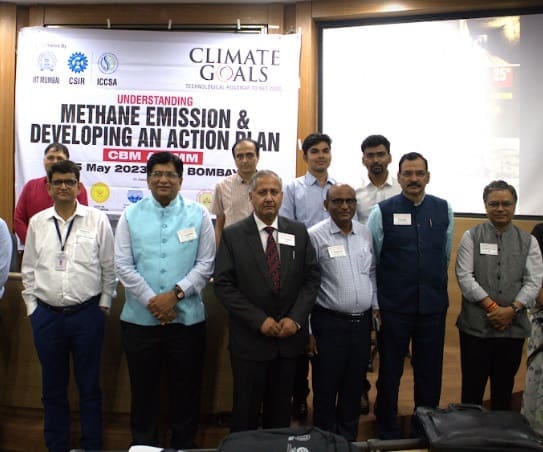At a time when India requires uninterrupted energy to fuel its overall growth, we must fast track decisions by forming an inter-ministerial group to address issues related to Methane emissions, climate experts said. Given that India has an estimated Coal Bed Methane Reserve of 2600 billion cubic metres, we collectively must apply ourselves to understand and take next steps.
Dr. Rakesh Kumar, OSD CSIR, Mr. Vilas Tawde, Ex-MD & CEO, Essar Oil & Gas, Dr. Ramesh Dod, Dr. J S Sharma Head ICCSA, Dr. Parag Sadgir, Mr. Prakash Jha Chief Manager CMPDIL (Right to Left)
Studies conducted by Oil and Natural Gas Corporation (ONGC) and Centre for Mining and Fuel Research Institute (CIMFR) establish the potential methane emissions from Coal Mines and gas exploration sites that could be used as fuel for industries energy demand as well as domestic fuel supply. Identifying the most economically feasible technology innovations towards harnessing energy from the available resources within the country is the immediate need of the hour, the experts said.
“For faster and practical decisions on Methane we must have an Inter-ministerial group to decide on related matters. Therefore, we request the government to create an inter-ministerial group for methane related issues… India touched a record-high growth in coal production of more than 778 Million Ton, posting record growth in the year 2022 – 2023. Plan is to increase the production to one billion ton by 2024 – 2025 therefore we collectively must tap and utilise Coal Bed Methane before we mine coal which in turn would help reduce emissions and also boost India‘s energy security,” stated Dr J S Sharma, Head International Center for Climate and Sustainability Action Foundation (ICCSA) at the workshop ‘Understanding Methane Emission & Developing An Action Plan‘. ICCSA, IIT Bombay and Council for Scientific and Industrial Research jointly organised the brainstorming discussion with a view to bring the issues of methane emission and energy security while addressing climate change.
We must adopt an EESE approach, which is Environment, Ecology, Economic, and Social , as we deal with Coal Bed Methane or Coal Mining Methane issues. Dr Sharma added that assessment of EEES aspects must be integrated with coal mines until scientific mine closure. Abandoned mines have also been contributing to overall degradation and diffused methane emissions, added Dr Sharma.
Shri Rajeev Kumar Mital, IAS, Principal Secretary, Expenditure, Finance Department, Govt of Maharashtra, said, “… It is very important to take the necessary steps to achieve the Net Zero target. Because coal will continue to fuel our growth for quite some time and the transition required is huge. The effective transition will require all sectors to take necessary action. We must deploy advanced technology like AI and data analytics to make smart choices towards achieving and addressing challenges to ensure just transition.“
Dr. Rakesh Kumar Officer on Special Duty at Council for Scientific and Industrial Research (CSIR) said that though the government is sensitive towards climate change and actively involved in this conversation nationally and internationally. While we address the issue of carbon-di-oxide still, we must also have pro-active discussions on Methane and non-CO2 GHGs . The action must happen at a granular (state) level. We must start looking at methane and prepare ourselves to use it, as it is a win-win for every stakeholder.
“Methane offers a huge opportunity for ensuring social and economic benefits. There is a need to sort out finance related challenges in Methane handling collectively, and we must encourage start-ups in this domain. Maybe a special fund can be created that can finance research work in this direction. Student chapters in various universities can also be created to prepare us to better handle the issue in the immediate future,” said Dr Rakesh Kumar.
Commenting on faster decision making on methane capturing Mr. H Madhavan, former ED and Basin Manager, ONGC said that public sector companies such as ONGC, Coal India and others may also create Special Purpose Vehicles (SPVs) within organisations for smooth operations on methane capturing and its use.
Tomas de Oliveira Bredariol, Energy and Environmental Policy Analyst, International Energy Agency said, “India has a reasonable opportunity to harness and reduce Coal Mining Methane emissions by around 30 percent. While de-gassification of mines could reduce around 10 percent of CMM emissions from mines in India at no net cost.”
Citing successful examples of Methane use, Mr. Vilas Tawde, Ex-Managing Director & CEO, Essar Oil & Gas said that the private company have successfully experimented mixing 60% gas and 30% diesel to run vehicles in coal mining areas. “There is no concern on safety, the only issue is acceleration,” he said adding that India relies majorly on coal production from open cast mines, increasing production may require adoption of deeper mining of coal seams. If that is the case, utilisation of CMM before mining coal could be exploited as a potential energy source which also has a co-benefit of avoiding accidental fire hazard due to methane release.
India is emerging as a Global Leader in Climate Change Initiatives. Therefore, India needs to continue establishing sector-specific baselines datasets, which can help India delineate an action plan in its focused efforts on reducing GHGs and methane. Furthermore, with these datasets generated over time, India will be better poised to take its initiative into a global platform through showcasing Indias methane-reducing technologies/processes, which have been developed and are being implemented across the country, added Dr J S Sharma.
The workshop was attended by Prof. Virendra Sethi, Environmental Sciences and Engineering at IIT Bombay; Dr. Arnab Dutta, Associate Professor, Interdisciplinary Programme in Climate Studies, IIT Bombay, Dr. Vikram Vishal, coordinator of COE on CCUS at IIT Bombay, Dr. Debadutta Mohanty, Principal Scientist & Head CSIR-Central Institute of Mining and Fuel Research (CIMFR), Dr. P C Jha, Chief Manager-Environment, Central Mine Planning and Design Institute (CMPDIL), and Prof. Santanu Banerjee, Earth Science Department, IIT Bombay besides others.

